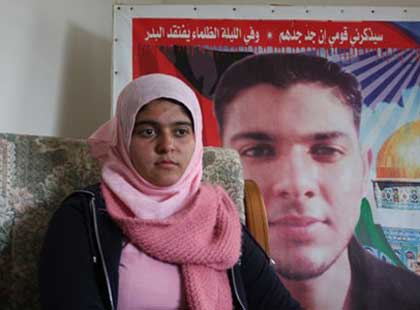Gazan Children Bear 'Scars Of War'
By Phoebe Greenwood
29 December, 2009
Aljazeera

Samar Zaquot sits in front of a portrait of her eldest brother, Mohammed, that almost reaches from the floor to the ceiling of her parents' front room in Beit Hanoun in northern Gaza.
Mohammed was 20 when he was killed by an Israeli rocket while having a picnic with friends, just before Israel's Gaza offensive began on December 27 last year.
Sixteen-year-old Samar smiles as she remembers where she was on the first day of Israel's three-week military offensive that would leave 1,400 Palestinians dead, including 352 children.
"It was the first day of our leaving exams at school. We were just going into our classrooms and preparing to sit the test when we heard the bombs falling. None of us expected it.
"My friends started crying and screaming. They were all terrified but I wasn't. I told them, 'don't be scared, if we die it is our judgement'. Ever since Mohammed was killed, I don't care if I die or not," she says.
'No hope'
Operation Cast Lead destroyed 3,500 Palestinian homes and 280 schools and Israel's tight restrictions on the movement of people or materials in or out of Gaza means that one year on, the region is yet to rebuild itself physically or psychologically.
Ahmed Awad, a child psychologist who worked as a counselling manager at the ministry of education until 2008, warns: "Every single child in Gaza is traumatised by what they experienced during the war. They all heard the aircrafts, the bombs and the shelling, they all feel unsafe. But around 60 per cent are still suffering from shock.
"These children display symptoms of acute fear, anxiety and depression. They have an overwhelming pessimism for the future. A huge number of children in Gaza have no hope."
Twelve-year-old Waid lost her younger sister during the war. On Saturday, January 3, the Israeli military started shooting at Waid's family's two-story home. The family of eight huddled together in one bedroom as the gun-fire continued during the night. The next day, two bombs were dropped on the house injuring every member of the family and killing four-year-old Weian.
"My head was hurt in the bombing but I knew my sister and mum were hurt worst of all. My father wanted me to join him at the hospital so my cousin came to take me," Waid says.
"In the taxi, the driver asked him how my family was and he told him that we were all okay except my little sister who had died. That's how I found out she had been killed. I cried all the way to the hospital."
The family's home was completely destroyed by the bombs so they now rent a small house in Beit Hanoun.
Waid's mother, Karima, says her daughter has lost weight and become very sensitive, crying at any perceived criticism or insult.
Her four-year-old brother, Mohammed, screams and clings to his mother whenever he hears a car or motorbike, mistaking the noise for a plane he thinks will bomb them.
"I take a long time getting to sleep at night. I remember how my sister used to crawl in and sleep beside me. Sometimes I feel like I don't want to leave the house at all," Waid says.
'Regaining their childhood'
Save the Children has been working across Gaza since February, running safe places for the children to play and draw together. The organisation has so far worked directly with 26,500 children.
Ibrahim Abu Sobeih, the charity's child protection co-ordinator in Gaza, says: "Our first priority is to try and restore a sense of well-being and normality; let children express themselves and burn off some energy. We are helping them take baby steps towards regaining their childhood."
Echoing Awad, Samar believes the experience of war, the blockade and sustained instability have combined to wreak deep and complex psychological damage on Gaza's children.
She refers to an eight-year-old she knows whose leg became infected during the war. He needed an operation but was unable to leave Gaza so doctors at the besieged hospital were forced to amputate.
"Most kids here hate their lives - many have lost their homes, parents, brothers and sisters. But what they all want most is peace. The last thing we need is another war," Samar says.
Awad remains determined but admits the crisis in Gaza poses a professional challenge that is beyond his reach.
He says: "We can reassure and support but what these children need most of all is to feel safe, but they don't because they are not safe."
Phoebe Greenwood is a media manager with Save the Children.


